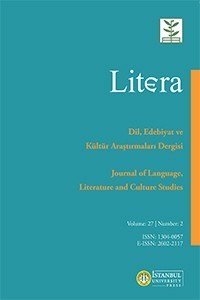Deconstructive Critique of the Story «Cirios Rojos» by Segundo Serrano Poncela
Deconstructive Critique of the Story «Cirios Rojos» by Segundo Serrano Poncela
This paper analyses the story «Cirios rojos» by Segundo Serrano Poncela from a deconstructive perspective. Segundo Serrano Poncela wrote the story during his exile in Latin America and tells an event that occurred at the beginning of the military conflict of 1936. The story pits members of the two sides of the Spanish Civil War, a devout woman and a Republican man, against each other in a life-and-death struggle. Serrano Poncela presents an inside observation of the thoughts and feelings of his characters and brings out their different visions. The unforeseen confrontation of the two adversaries becomes a conflict between them; the devout woman wishes to expel the republican as her enemy; he is dependent on her help. The woman’s house becomes a battlefield for them, where one wants to save herself from the presence of the other, and the other wants to save his life. The text constructs a hierarchical opposition between the two; it elevates one and lowers the other, underlining the inherent characteristics of the two points of view. Focusing on significant points in the text, we try to show how the higher side of the hierarchy overthrows its own logical system, falling into contradictions between what it stands for and what it does.
Keywords:
«Cirios rojos», Segundo Serrano Poncela, La narrativa del exilio español, Deconstrucción Oposiciones jerárquicas,
___
- Abellan, J. L. (1983). De la guerra civil al exilio republicano (1936-1977). Madrid: Mezquita. google scholar
- Asensi, M. (1990). Teona literariay deconstruccion. Madrid: Arco/Libros. google scholar
- Ayala, F. (1949). Para quien escribimos nosotros. Cuadernos Americanos, 1, 36-58. google scholar
- Balkin, J.M. (1987). Deconstructive Practice and Legal Theory. The Yale Law Journal, 96 (4), 743-786. google scholar
- Blanco Aguinaga, C. (2006). Ensayos sobre la literatura del exilio espanol. Mexico, D.F.: El Colegio de Mexico. google scholar
- Derrida, J. (1971). De la gramatolog^a. (O. del Barco y C. Ceretti, Traductores). Buenos Aires: Siglo Veintiuno Argentina. google scholar
- Derrida, J., & D. Caputo, J. (2009). La deconstruccion en una cascara de nuez. (G. Merlino, Traductor). Buenos Aires: Prometeo Libros. google scholar
- Eagleton, T. (1983). Literary Theory: An Introduction. Oxford: Basil Blackwell. google scholar
- Larraz, F., & Sanchez Zapatero, J. (Eds.) (2016). Los restos del naufragio: Relatos del exilio republicano espanol. Madrid: Salto de Pagina. google scholar
- Montiel Rayo, F. (1998). El Caudillo, tragedia inedita de Segundo Serrano Poncela. El exilio literario espanol de 1939: Actas del Primer Congreso Internacional celebrado del 27 de noviembre al 1 de diciembre de 1995, Vol II (pp. 521-532). Barcelona: Gexel. google scholar
- Mora de Frutos, R. (2001). El ejercicio de la cntica literaria en La puesta de Capricornio de Segundo Serrano Poncela. El exilio literario de 1939. Sesenta anos despues: Actas del Congreso Internacional celebrado en la Universidad de La Rioja del 2 al5 de noviembre de 1999 (pp. 441-450). Logrono: Universidad de La Rioja. google scholar
- Sanz Villanueva, S. (1977). La narrativa del exilio. En J. L. Abellan (Ed.), El exilio espanol de 1939, Tomo IV: Cultura y Literatura (pp. 109-182). Madrid: Taurus Ediciones, S.A. google scholar
- Serrano Poncela, S. (1959). La puesta de Capricornio. Buenos Aires: Editorial Losada. google scholar
- Serrano Poncela, S. (1963). Formas de vida hispanica: (Garcilaso, Quevedo, Godoy y los ilustrados). Madrid: Gredos. google scholar
- Zelaya Kolker, M. (1985). Testimonios americanos de los escritores espanoles transterrados de 1939. Madrid: Ediciones Cultura Hispanica. google scholar
- Başlangıç: 1954
- Yayıncı: İstanbul Üniversitesi
Sayıdaki Diğer Makaleler
Doctor Who’s Ecocritical Revisit to Narnia
Collecting and Destroying Postcards: Discursive Travel in Lynne Tillman’s Motion Sickness
Mythopoeic Image of the City in T. S. Eliot’s The Waste Land
Vibrant Matter, Actants and the Limits of Human Agency in Saramago’s The Stone Raft
Tracing Gender in The Rock of Tanios in the Context of Feminist Literary Criticism
A Micrology of Pattern Recognition in Philip K. Dick’s A Scanner Darkly
Medusa and Matisse: Myth and Art in A.S. Byatt’s “Medusa’s Ankles”
A Study of Henrik Ibsen’s The Lady from the Sea from the Perspective of Ecofeminism
